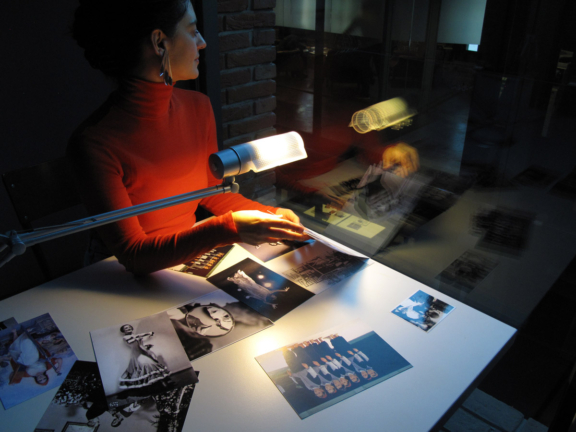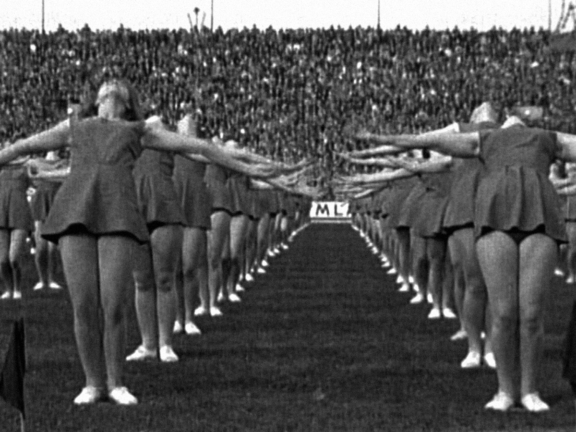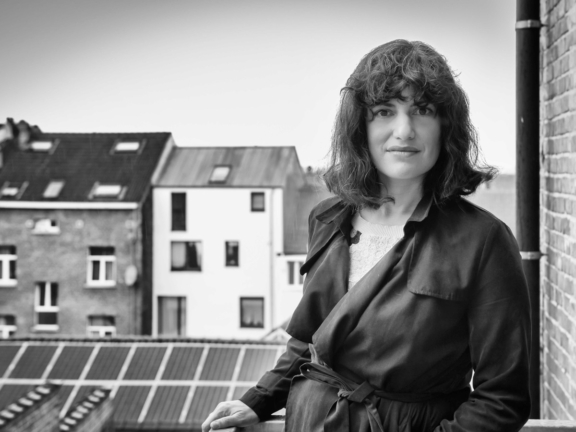
On the possibilities of conserving performance
By Hélia Marçal
Event Slider
Date
- / Cancelled / Sold out
Location
Room 1 Calouste Gulbenkian FoundationTransmission, choreography and history synthesise key ideas of the dance not dance programme, which will be addressed during a full day dedicated to the subject, starting with this conference by Hélia Marçal.
As a researcher and specialist in performance conservation, Hélia Marçal addresses the issue of preserving works of dance in light of their recent acquisition by modern and contemporary art museums, sharing some of the challenges that the methods she developed at the Tate Modern entail for the history of dance in particular and art history in general.
Performance is typically considered unrepeatable and difficult to record (if not impossible) – if movement is dependent on the body, rarely does its history extend beyond its representation. This presentation seeks to contest that premise, analysing the epistemic possibilities that arise from conserving performance.
The conference is followed by a conversation with João dos Santos Martins, Ana Bigotte Vieira, Carlos Oliveira and Ana Dinger (the curators of dance not dance), in which the programme is discussed through the lens of transmission in dance and the presence of dance in the gallery and museum space is questioned.
On the same day, the conference-performance Envelopment, history and syncope by Isabel de Naverán, the screening of the film Yugoslavia: How ideology moved our collective body by Marta Popivoda and the conference Social Choreography: Rehearsing order for appearances of disorder by Bojana Cvejić also take place.
Image © Jürgen Fritz
Hélia Marçal (1988) is a Lecturer in Art, Materials and Technology at University College London and an integrated researcher at the Institute of Contemporary History, where she has worked as a Science Manager. She has also worked as a Contemporary Art Conservation and Research Fellow on the project "Reshaping the Collectible: When Artworks Live in the Museum", funded by the Andrew W. Mellon Foundation at Tate (2018-2020).
João dos Santos Martins (1989, Santarém) is an artist whose work encompasses various modes of expression within the field of dance, through choreography, exhibitions and publications. In his practice, he favours collaborative and cooperative approaches, having created pieces such as Projecto Continuado (2015) – SPA Authors Prize – and Companhia (2018), with Ana Rita Teodoro, Clarissa Sacchelli, Daniel Pizamiglio, Filipe Pereira and Sabine Macher, or Onde Está o Casaco? (2018), with Cyriaque Villemaux and Ana Jotta. He has performed works by Eszter Salamon, Xavier le Roy, Moriah Evans, Boris Charmatz and Jérôme Bel, among others. In 2019 he founded the biannual journal Coreia.
Ana Bigotte Vieira (1980, Lisbon) is Co-IR of the FCT Archiving Theatre project and an integrated researcher at the Institute of Contemporary History. She has published Uma Curadoria da Falta, about the ACARTE service of the Calouste Gulbenkian Foundation in 1984-1989, based on her doctoral research. Between 2018 and 2023 she was part of the curating team at Teatro do Bairro Alto. Together with João dos Santos Martins, she started the project For a Timeline to Be – genealogies of dance as an artistic practice in Portugal, of which dance not dance – archaeologies of new dance in Portugal is the 7th edition.
Carlos Manuel Oliveira (1980, Santarém) works as an artist in the fields of choreography and performance. After a period of research dedicated to critiquing the relationship between choreography and dance – he was a researcher at universities in Europe and the USA, teaching at some of them and receiving his doctorate in 2016 from the UT Austin | Portugal Programme with the thesis "Objectos Coreográficos: Abstracções, Transducções, Expressões" [Choreographic Objects: Abstractions, Transductions, Expressions] –, he has dedicated himself, since 2017, to producing, creating and presenting his artistic and curatorial work.
Ana Dinger (1979, Porto) is an artist and researcher with a background in visual arts and dance. She has a degree in Sculpture (FBAUL), a postgraduate degree in Contemporary Art (FCH UCP) and is studying for a PhD in Cultural Studies (FCH UCP). She collaborates with various projects that involve programming, curating, editing and research work, as well as artistic creation and experimentation: AND Lab (since 2015), For a Timeline to Be – genealogies of dance as an artistic practice in Portugal (since 2019), Es.Col.Az (since 2021) and Assembleia Ordinária (since 2021).
Maria de Assis (1956, Lisbon) is Chair of the Advisory Board of the National Arts Plan and Deputy Director of the Gulbenkian Culture Programme. With a degree in History and a post-graduate degree in Arts Management, she has worked in a wide range of fields, from journalism to programme consultancy, including curating projects at the crossroads between the arts and education.
dance not dance
This event is included in the (re)performances, films and talks series which constitutes the first part of dance not dance – archaeologies of the new dance in Portugal. More info.
The Calouste Gulbenkian Foundation reserves the right to collect and keep records of images, sounds and voice for the diffusion and preservation of the memory of its cultural and artistic activity. For further information, please contact us through the Information Request form.



